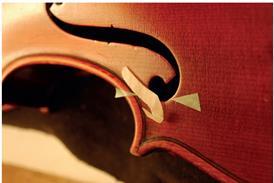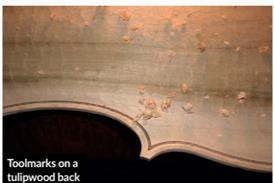- News
- For Subscribers
- Student Hub
- Playing Hub
- Podcast
- Lutherie
- Magazine
- Magazine archive
- Whether you're a player, maker, teacher or enthusiast, you'll find ideas and inspiration from leading artists, teachers and luthiers in our archive which features every issue published since January 2010 - available exclusively to subscribers. View the archive.
- Jobs
- Shop
- Directory
- Contact us
- Subscribe
- Competitions
- Reviews
- Debate
- Artists
- Accessories
Masterclass: Liisa Randalu on Smetana’s Quartet no.1, ‘From My Life’

Violist Liisa Randalu of the Schumann Quartet gives her perspective on the first movement of the Czech composer’s passionate and dramatic semi-autobiographical work
Explore more Masterclasses like this in The Strad Playing Hub
Read more premium content for subscribers here
Smetana had been deaf for two years when he wrote his first string quartet in 1876, aged 52. At that time he was a poor widower, living with his eldest daughter in a gamekeeper’s lodge in the Czech village of Jabkenice, hopeful that his hearing might one day return. It did not, and by April 1884 his health had deteriorated so much that he was admitted to the Prague Lunatic Asylum, where he died that May.
The piece, entitled ‘Z mého života’ (‘From My Life’) is programmatic and autobiographical. It is also passionate, dramatic and extremely hard for the viola, which Smetana gave a special role, perhaps because it is the stringed instrument that sounds closest to the human voice. The quartet was publicly premiered in Prague in 1877; in 1878, Dvořák played the viola part at a private performance at the house of Smetana’s friend, Josef Srb-Debrnov. Smetana wrote in a letter to Srb-Debrnov, ‘I wanted to depict in music the course of my life. … The composition is almost only a private one … for four instruments which, as in a small circle of friends, talk among themselves about what has oppressed me so significantly.’ The first movement represents his ‘yearning towards art in my youth, my romantic frame of mind, the inexpressible longing for something I could neither put into words nor truly define’, filled with falling 5ths that he described as premonitions of fate. Its key of E minor, together with a sustained high E in the fourth movement, represents the pitch of the tinnitus that haunted him at the onset of his deafness – ‘a pounding and intense hissing in the head, day and night, without ceasing, as if I were standing underneath a huge waterfall’. To end, the music fades into nothing.
Already subscribed? Please sign in
Subscribe to continue reading…
We’re delighted that you are enjoying our website. For a limited period, you can try an online subscription to The Strad completely free of charge.
* Issues and supplements are available as both print and digital editions. Online subscribers will only receive access to the digital versions.




























